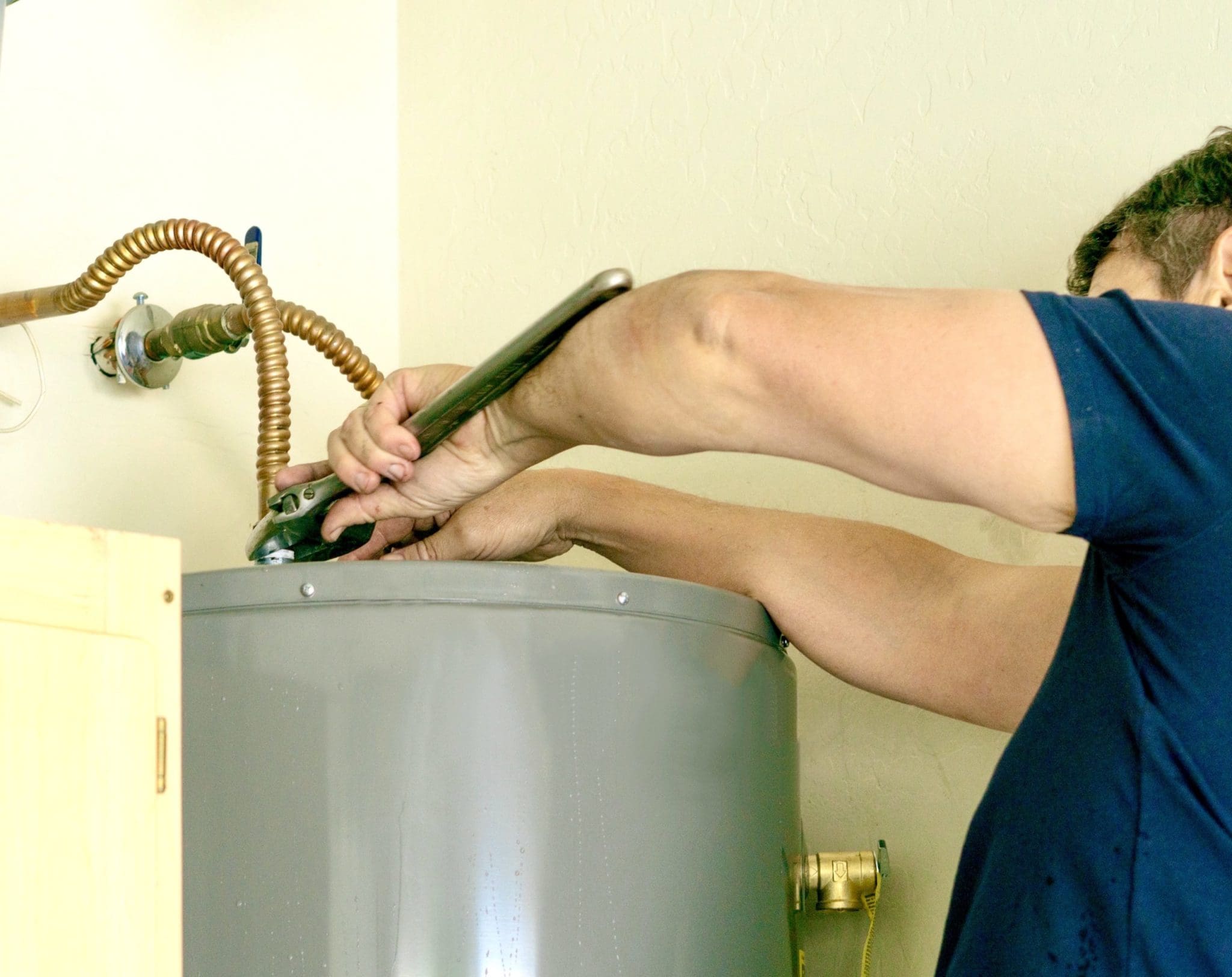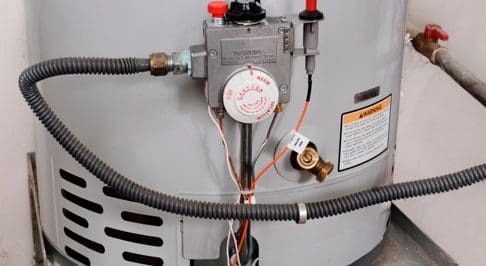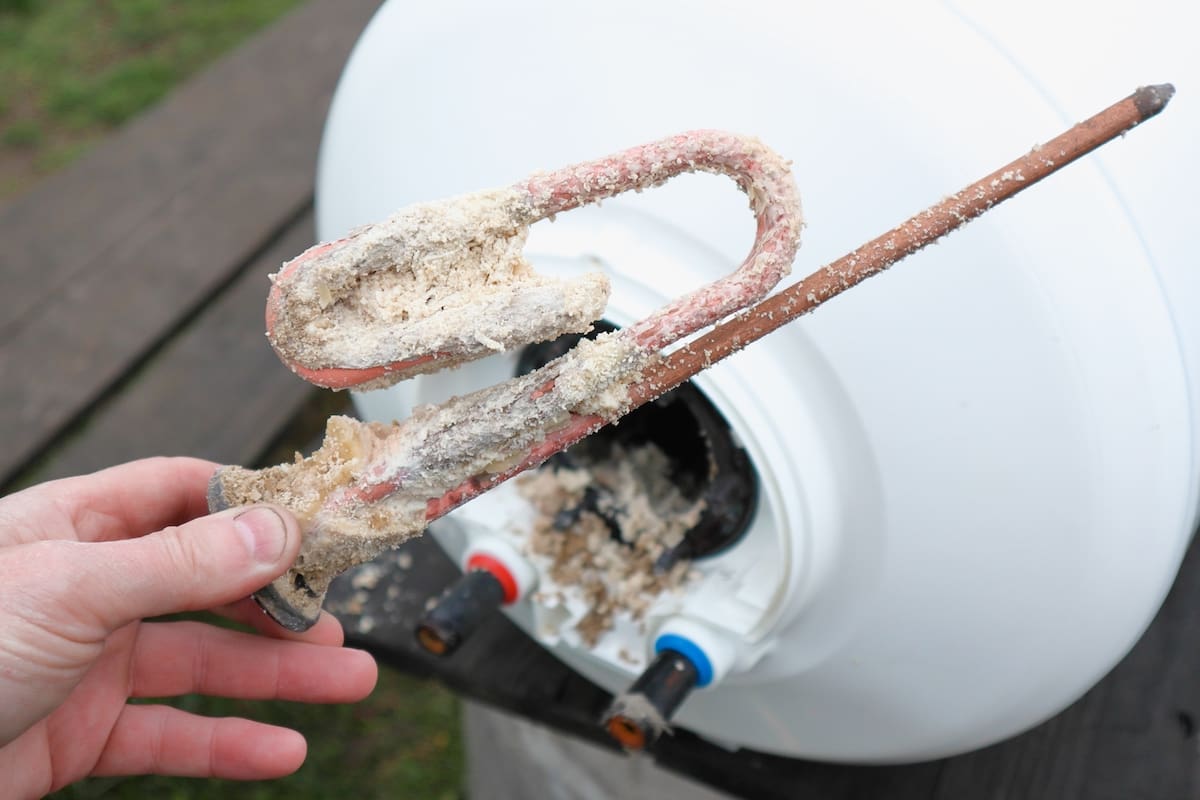
Water heaters play a role in our lives as they provide us with hot showers, clean dishes, and sanitized laundry. However, it’s important to keep in mind that these essential appliances have a lifespan. There are five types of water heaters and our experts here at 4 Service Pros will walk you through the signs that indicate your water heater might be reaching its end.
We’ll offer insights to help you identify problems, understand when to seek professional assistance, and effectively maintain your water heater for optimal performance. Let’s get started.
Bad Water Heater Element Symptoms
Experiencing problems with your water heater can be quite frustrating. It’s important to be able to identify the signs of a water heater element problem, as it can help you troubleshoot the issue and seek assistance. Here are a few indications that you should watch out for.
Lukewarm Water 
One of the signs that there might be an issue with your water heater element is when the water only becomes lukewarm. Either one or both of the elements in your heater may have stopped working. A broken element can’t heat the water effectively, resulting in water that’s only mildly warm instead of hot.
Small Amount of Water Coming Out
A reduced water flow could also indicate a problem with your water heater element. If the component is damaged or covered in sediment, it may struggle to heat water efficiently. This could result in less hot water coming out of your faucets.
No Water
In some cases, a bad water heater element may result in no hot water at all. If both elements fail, the water heater won’t be able to heat water, leaving you with only cold water.
Other bad water heater element symptoms to watch for are:
- Fluctuating temperatures
- Popping or hissing noises
- A tripping circuit breaker.
Contact a professional if you encounter any of these problems. Professionals like those here at 4 Service Pros have the expertise to accurately identify the common water heater issues and ensure it’s working again.
Testing Water Heater Element
As we mentioned before, if you’re experiencing issues with your water heater, it may be due to a faulty element. Here’s a step-by-step guide on safe water heater element testing.
Step 1. Power Off the Water Heater
Safety should always come first when working with electricity. Therefore, before you begin testing, switch off the power supply to your water heater. Do this by shutting off the circuit breaker associated with the water heater, typically in your home’s central breaker box.
Step 2. Uncover the Metal Plates
You’ll find one or two metal plate covers on the side of your water heater. These protect the thermostat and heater element. Remove them by unscrewing the Phillips head screws using a screwdriver or power drill.
Step 3. Get Rid of the Insulation and Plastic Shield
Underneath the metal cover, you’ll find insulation and a plastic shield. The insulation can be rigid foam or flexible fiberglass, which you can remove by hand or cut out if necessary. The plastic shield can be unclipped from the metal tabs. Be careful not to damage these components, as they must be reinserted after the test.
Step 4. Find the Heating Element
You should now see the thermostat and heating element with the covers and insulation removed. The thermostat is usually rectangular, with several wires connected to it. Below it, you’ll find the heating element, with its visible part being the square base with two screws attached to electrical wires.
Step 5. Confirm the Power Is Off
Use a non-contact multimeter to confirm the electricity is off. If the tester lights up or beeps or the multimeter shows a reading between 110 and 130, the electricity is still on.
Step 6. Test the Water Heater Element
Now we have to test the water heater element. Adjust your multimeter to the lowest ohms setting to check the heating element. Measure the resistance by connecting the probes of your multimeter to the screws on the heating element. A functional heating element should give a reading between 10 and 30 ohms. If the reading is lower, the heating element is faulty and you’ll need a water heater replacement. Repeat this step if your water heater has two elements.
Step 7. Reassemble Your Water Heater
Once you’ve completed the test, you must put everything back together. Replace the plastic cover and insulation, then reattach the metal plate covers. Turn the circuit breaker back on to restore power to the water heater. If you had to replace a heater element, wait a few hours for the water to heat up to confirm that the repair was successful.
What Causes a Hot Water Heater to Go Bad?
To better understand why a hot water heater may fail, it’s essential to grasp its inner workings. Traditional water heaters consist of a water storage tank encased by protective linings. At the heart of the unit sits a pipe that houses the burners responsible for heating the water.
The configuration of these components can vary based on whether the heater is electric or gas-powered. The anode rod is a key part of the system, which acts as a magnet for corrosive particles, prolonging the unit’s lifespan. Now, let’s look into what causes a hot water heater to go bad.

Anode Rod Depletion
The anode rod is crucial in preventing corrosion within the water heater. However, the rod itself deteriorates over time as it attracts corrosive elements. As the rod gets used up, it becomes less effective at protecting the tank, making the unit prone to corrosion and failure.
Tank Corrosion or Leakage
The water storage tank can corrode over time, mainly if the anode rod no longer functions effectively. This corrosion can cause leaks, which can cause significant damage and eventually render the water heater inoperable.
Faulty Heating Elements
Heating elements are responsible for warming the water in your heater. These components can break or cease functioning due to wear and tear or electrical issues. A faulty heating element can result in lukewarm or cold water.
Hot Water Heater Bad?
Don’t let a faulty water heater disturb your daily routine. At 4 Service Pros, we specialize in repairing and installing hot water heaters, ensuring your home has an efficient and reliable hot water supply.
Don’t wait for the situation to worsen. Contact us online or call 571-281-0281 with questions or book an appointment online. Our team of professionals is ready to provide you with top-notch service, whether a simple repair or a complete water heater replacement. Trust 4 Service Pros to get your hot water flowing again.


